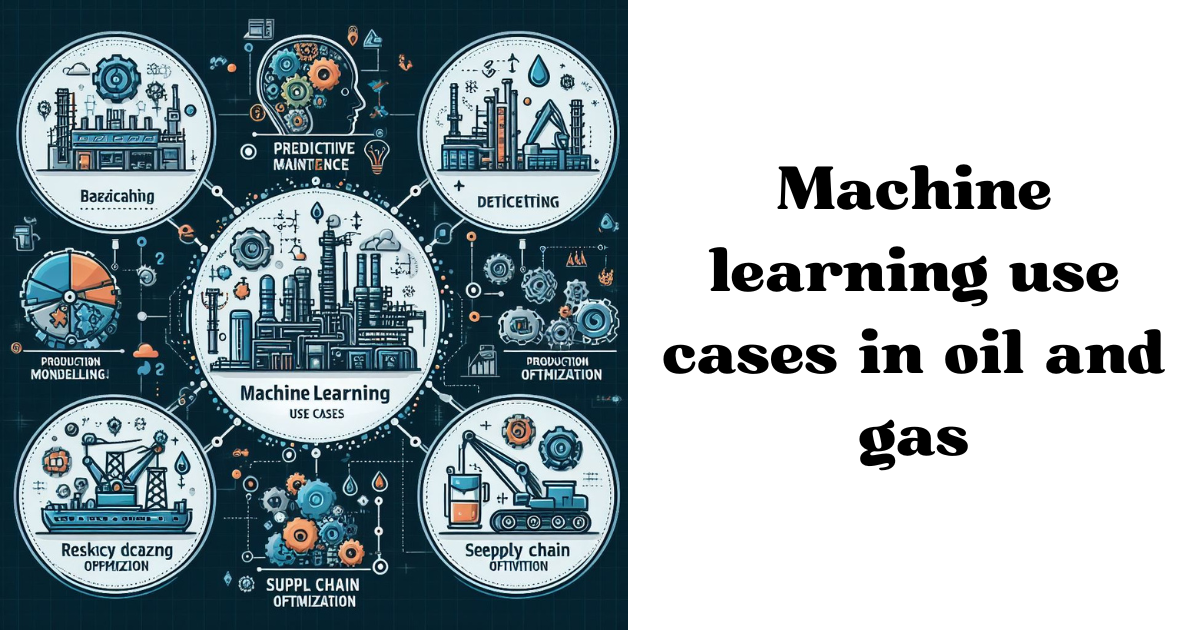The oil and gas industry has customarily desired manual processes and human skills to run effectively and cut costs. However, a notable shift towards encompassing machine learning technologies has occurred in recent years.
Machine learning, a component of artificial intelligence requires using algorithms and statistical models to enable computers to learn from data and make predictions or take steps without programming. The expanding use of machine learning in the oil and gas industry is driven by its potential to add value by enhancing processes and saving costs.
Machine learning algorithms can analyze vast amounts of data, recognizing patterns and trends. This allows them to identify inefficiencies, predict equipment problems, optimize maintenance schedules, monitor storage applications, increase drilling operations, and enhance pipeline monitoring.
Now, let’s take a careful analysis of some of these applications.
Table of Contents
TogglePredictive Maintenance
Machine learning is really helpful in the oil and gas industry, specifically in keeping an eye on the machines we use. Usually, we either follow a prearranged schedule for maintenance or only fix things when they violate, inducing a lot of unnecessary respite and spending more money on repairs.
But with machine learning, companies can predict when equipment might break by observing past data, sensor readings, and other important details. By recognizing signs that show something might go wrong soon, companies can plan to fix things before they break, reducing downtime and spending less money on maintenance.
For instance, a big oil refinery in Texas used a machine learning system to predict when their pumps might fail. The system looked at data from sensors on the pumps and could
Accurate prediction when a pump might have problems.
This helped the refinery plan maintenance before time, and they had 30% less downtime due to pump failures. This retained them a lot of money in the long run.
Reservoir Monitoring
Machine learning is helping a lot in monitoring how well oil and gas reserves are doing and making them work better. The usual methods for watching over reserves involve manual work and looking at seismic data. But now, machine learning programs can handle a ton of data from various sources, like logs, production records, and geological surveys.
They find patterns and trends that can make oil and gas reserves work even better.
These machine-learning programs can determine if there’s a chance to get more oil and gas from the reserves by watching how they’re doing in real-time.
For example, a big oil company in Norway used a machine learning system to keep track of their reserves. The system looked at data from sensors in wells and reservoirs and found things they didn’t know before. This helped them make better decisions, and they got 10% more oil, making a lot more money.
Drilling Optimization
Machine learning is changing how we drill for oil and gas. The usual drilling methods take a lot of time and money. But with machine learning, we can make drilling operations better, faster, and cheaper.
Machine learning uses special computer programs to find the best ways to drill. These programs look at drilling data, like how we drill, what kind of rocks we’re drilling through, and past drilling records. The programs learn from this data, getting better over time.
For example, big oil and Gas companies in the United States use a machine learning system to improve drilling. The system looked at real-time drilling data and suggested changes to how they drill. This led to a 15% decrease in drilling time and saved much money.
Pipeline Monitoring and Environmental Impact
Machine learning makes pipelines safer by helping monitor them better and lowering the chances of leaks or accidents. Special computer programs use machine learning to check data from sensors on pipelines. If something unusual might mean a leak or problem, these programs can find it.
This helps companies take action early to stop incidents and limit environmental harm. Additionally, machine learning is useful for managing waste in the oil and gas industry.
By looking at data about how much waste is made, how it’s thrown away, and environmental rules, machine learning can find ways to reduce waste and recycle more. This doesn’t just help the environment; it also makes operations run better.
Predictive Analytics and Market Trends
Machine learning is changing how companies understand market trends and make important decisions. With predictive analytics, special computer programs can look at a lot of market data, including past sales, how customers behave, and other factors, to guess what might happen and set the best prices.
For example, a big oil and gas company used machine learning to study past sales and market trends. The company could predict what people would want and change its prices accordingly. This led to more sales and better profits.
Conclusion
Using machine learning in the oil and gas industry has vast ability. It can benefit, make things work better, make economies, and be more environment-friendly. Machine learning is changing how the industry does things, like keeping equipment in good shape, watching over oil reserves, making drilling more efficient, and checking pipelines.
By using machine learning programs, companies can predict when equipment might break, plan when to do maintenance, keep an eye on how well oil reserves are doing, cut down on drilling time and costs, find issues in pipelines, manage waste better, and making smart decisions based on what’s happening in the market.
The benefits of machine learning in the oil and gas industry are clear, and it’s important for the industry to keep exploring and using these technologies for success in the future.





